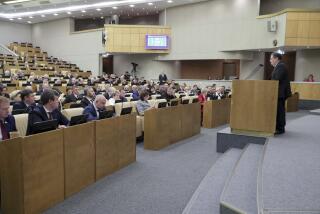Soviets Move to Overcome Budget Deficit
- Share via
MOSCOW — Soviet officials said today they will start liquidating unprofitable businesses and farms to bolster the nation’s economy and overcome a budget deficit expected to reach $58 billion next year.
It was the first time Moscow has ever announced a budget deficit.
“A number of enterprises are on the brink of being eliminated,” Finance Minister Boris Gostev told the 1,500 deputies of the Supreme Soviet legislature. They gathered today at the Grand Kremlin Palace in Moscow for a two-day session on a 1989 development plan and $804-billion government budget.
Gostev, who presented the deficit budget to the lawmakers, admitted the government of Mikhail S. Gorbachev is finding it difficult to bring deficit spending under control. The overspending began in previous Soviet regimes.
He said the deficit “is a problem that has not emerged just now, but is a result of the unbalanced economy, of the policy of extensive subsidizing and huge losses--of all that was brought about by extensive methods of economic management, parasitic attitudes and a passive financial policy.”
Gloomy Picture
The economic report presented to the deputies painted a gloomy picture of Soviet life with cramped housing, food rotting en route to stores, jammed trains during vacation periods and massive amounts of new equipment lying unused on factory floors.
However, the 1989 plan promised dramatic improvements in what Yuri Maslyukov, head of the state planning committee, acknowledged was a response to criticism in the press and legislature.
He said central planning will be slashed by restraining what ministries can do. This year, the state bought and redistributed 86% of production, but it will buy just 25% next year. Everything else must be sold on a new open market according to consumer demand.
“The state will cease to be the sole distributor of resources,” Maslyukov said.
In another bow to public pressure, he listed several development plans dropped due to environmental concerns, including two-thirds of 50 planned water projects.
More to Read
Sign up for Essential California
The most important California stories and recommendations in your inbox every morning.
You may occasionally receive promotional content from the Los Angeles Times.













